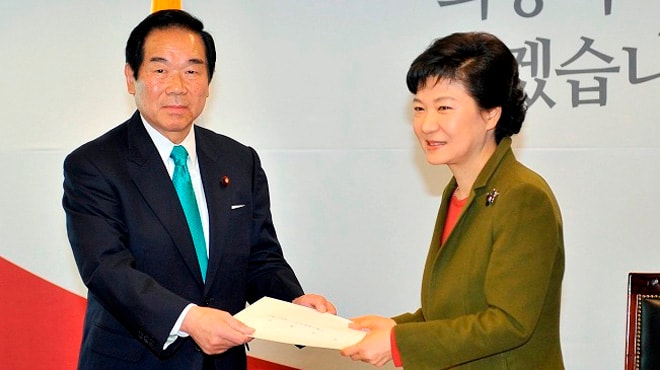Japan - South Korea mend bilateral relations
On January 4, Japanese Prime Minister Shinzo Abe's envoy, Mr. Fukushiro Nukaga, arrived in South Korea to meet with the country's future president, Ms. Park Geun Hye, to mend bilateral relations.

Mr. Fukushiro Nukaga presented the letter of the Japanese Prime Minister to Ms. Park Geun Hye.
- Photo: Reuters
Mr. Nukaga also presented Ms. Park with a letter from Prime Minister Abe. In the letter, Mr. Abe said that South Korea is "Japan's most important neighbor" and expressed his commitment to improving relations. Prime Minister Abe invited Ms. Park to visit Japan at the earliest date. According to Kyodo News Agency, Ms. Park accepted the invitation and promised to arrange the time.
In response, AFP reported that Ms. Park expressed her desire to restore reconciliation and cooperation between Japan and South Korea, affirming that the two countries need to build trust and look straight at history. "It is important to establish a friendly atmosphere from the beginning," Ms. Park said.
Before the trip, Kyodo said Mr. Nukaga had a press conference. "I want to convey the prime minister's message that Japan's relations with South Korea are fundamentally important for stability in Northeast Asia. I want to play a role as a bridge and make this a good year for both countries," Mr. Nukaga was formerly secretary-general of the Japan-Korea Friendship Parliamentarians' Association.
The talks took place in the capital Seoul, in the context of the new leaders of Japan and South Korea aiming to mend bilateral relations that have deteriorated recently due to the dispute over the Dokdo/Takeshima islands.
After the meeting with Park, Yonhap news agency reported that the Japanese delegation continued talks with Foreign Minister Kim Sung Hwan. Kim said, "South Korea wants to further strengthen bilateral relations with Japan in various areas while building mutual trust." In response, Nukaga said that Prime Minister Abe's new government seeks "a good start" with the incoming South Korean government.
However, Mr. Nukaga expressed regret over a South Korean court's rejection of Japan's extradition request for a Chinese national who attacked the Japanese Embassy in South Korea last year. Prime Minister Abe also opposed the South Korean court's ruling, saying it affected the extradition treaty between the two countries. "This is an extremely regrettable decision and I strongly oppose it," Prime Minister Abe said in the central Japanese city of Ise on January 4.
According to Tuoitre - DT






